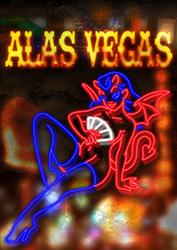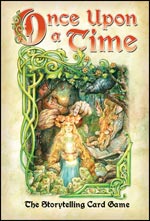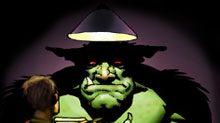Once
upon a time (ahem), James Wallis was the Director of Hogshead
Publishing, the UK company behind Warhammer Fantasy Roleplay, Nobilis 2e, and the New Style RPGs. He also brought industry folks together to celebrate innovation with the Diana Jones Award, now an annual tradition. When we last spoke with James, he had
sold his company and was moving on to other things. Ten years later, Mr Wallis has
returned with a new Kickstarted roleplaying project, Alas Vegas. Allan
Sugarbaker had a few questions for him.
 So, wait – who are you again?
So, wait – who are you again?
I'm James Wallis, and I've been kicking around the games industry for
thirty years now. High points: the storytelling card-game Once Upon a
Time; the journal of game narrative and roleplay Interactive Fantasy;
founding Hogshead Publishing in 1995 and proving that an independent
British RPG publisher could crack the American market; Warhammer Fantasy
Roleplay; accidentally creating the Story Games genre with The
Extraordinary Adventures of Baron Munchausen in 1998 and Hogshead's line
of 'New Style' games; publishing Nobilis 2e; and cashing out and going
off in a huff in 2003.
You've been taking an extended break from game publishing
(Hogshead Publishing closed up shop ten years ago this month, right?).
Catch us up. What have you been up to?
Hogshead didn't close ten years ago, I sold it ten years ago and it
became a d20 shop. I'm not sure how much longer it lasted after that.
One of the weird things about this industry is that it's so rare for
someone to sell a games company as a going concern and so common for
publishers to go bust or just disappear that a lot of otherwise
well-informed websites still claim that I quit the industry because
Hogshead had failed.
But yeah. I went off to the Caribbean for a bit, and then I came back
and did some film publicity work for a few years, and then I helped a
couple of friends set up a digital agency called Six to Start (they did
the Zombies Run app), and I lectured in game design at the University of
Westminster. For the last few years I've been running my own games
consultancy, Spaaace – we're a triple-A company – which mostly seems to
involve telling TV companies that they're doing games all wrong.
I'm still having fun.
When you sold Hogshead, did folks think you were crazy for leaving
the game industry? After all, "It's the game industry – that's super
fun, right?"
I didn't get that at the time. I do think a lot of players assume that
the industry is much like any other and if you have a job in it then
that's a stable, decent income for you. This is not the case. I'm still
depressed by how many companies and creatives I assume are full-time
turn out to be essentially successful hobbies. But no, mostly I got
regret that Hogshead and its games were going away, and people wishing
me well for the future. The trolls and haters mostly stayed quiet.
As we're conducting this interview, you have a new roleplaying
game project fully funded through Kickstarter. Has this method made
publishing a game more manageable, or is it too early to tell?
Kickstarter has changed everything. It's a complete disruption of the
existing model of publisher-distributor-retailer, but in a way that
potentially benefits them too. The thing to understand about Kickstarter
is that it's not just a web-shop where people pay you in advance. There
are people who use it like that but they're massively undervaluing its
potential, like the guy who put up a Kickstarter project to raise money
for a book about how to make money on Kickstarter, and he failed to
reach his funding target.
Kickstarter is a funding engine, a publicity machine and a
market-research tool all in one application. It lets anyone put their
pet project before the market, get exposure for it, gauge how much
commercial appeal it has, and see if there's enough interest to bring it
to market. And I would argue that it is better at these things than
almost any competing system. Imagine you go to a games convention with
New Game X and ask people if they'd buy it. 70% say yes. What does that
mean? 70% of how many people? Were they just being polite? Put your
project on Kickstarter and people vote for it with their hot cash.
There's your initial market worth of your project right there. And if
it's not enough then you've found out that your product isn't commercial
or that you were too greedy, without having to spend several months and
a lot of money to do it.
There's an argument that says making money on Kickstarter isn't so much
about the quality of the product as the quality of the marketing
campaign promoting it. There's a counter-argument, mostly made by me,
that says the same thing is true of the games market as a whole, and of
the rest of the world too.
 Now let's talk about your Kickstarter project. Tell us about Alas Vegas.
Now let's talk about your Kickstarter project. Tell us about Alas Vegas.
Alas Vegas is a four-episode game set in a nightmarish version of Vegas,
where it's as if the skin of the city has been ripped away to leave the
flesh and bone bare. The PCs start the game waking up in a shallow grave
at the edge of the desert, with complete amnesia, and with only the city
on the horizon. It's their job to piece together who they are, how on
earth they got there, and how to survive long enough to get out, or at
least avoid being brutally murdered.
The phrase I'm over-using to describe Alas Vegas is "Ocean's Eleven
directed by David Lynch". Though you could equally describe it as a mix
of The Hangover meets The Prisoner.
You've got lots of roleplayers excited by the project. Is it a new
idea, or have you been chewing on it for a while?
Alas Vegas has had three periods of rumination. It started off as a
novel I plotted but never wrote back in the mid-late 1990s; it was going
to be my follow-up writing project after Baron Munchausen but for
various reasons never happened. Then a couple of years ago there was a
Game Chef competition with the key words 'desert', 'edge', 'city' and
'skin', and the opening scene of this book came rushing back to me: the
characters waking up in a shallow grave, naked and remembering nothing
at all, and gazing out over the vista of a scar of neon across the
horizon. And I thought, "Oh crap, I have to write this now."
I almost got it finished in time for the competition – in a much more
condensed, truncated form than it is now – and then there was a family
emergency the weekend before the deadline and I didn't get it done. But
it continued fermenting and growing like a vile tumour in the back of my
imagination. I know from experience the only way to cut these things out
is to write them down and publish them. And so the third period of its
gestation came when someone said, "Why don't you Kickstart something?"
So this is my first new RPG for fifteen years – since Munchausen, in fact.
I hadn't realised quite how rusty I'd got until I was about to start the
first playtest and realised I hadn't GMed a single RPG for over a
decade.
We're certainly big fans of storytelling games wherein everything
goes wrong, such as Fiasco. What were your influences when dreaming up
Alas Vegas? How will your game set itself apart?
Alas Vegas is an RPG, not a story-game, but it's not exactly a
conventional RPG. It's a 'blast', a format that originated in France a
few yeas ago: it's like a one-shot but more sustained. That means that
for your money you get a unique rules system tailored specifically to
this game; plus an adventure that plays to an ending-a proper one like
books and films have-in four sessions. The model is an HBO mini-series,
instead of the soap-operas that most RPG campaigns degenerate into. And
having four delineated sessions means each one can be properly
structured, with plot-twists, reversals and cliffhangers.
It's not a railroad, let me make that clear. But the meta-structure is
pretty rigid, and it's all leading to one major climactic scene.
The other thing is the PCs themselves. They begin the game naked and
memoryless-they're blank slates with blank character sheets. As things
progress they can gain abilities by creating flashbacks to incidents in
their earlier life where they're using that ability, but this is
structured so that each character's flashbacks will start to intersect
with other people's, and slowly they'll begin to remember what happened
to them and why they're here. This is entirely player-driven, it's not
scripted at all. The thing is, they're RPG characters, so they are
likely to find themselves in not-nice situations. So the abilities
they'll need may be not-nice as well, and so the flashbacks they have
will be coloured by that. And that ties into the whole – well, not the big
secret of the game since it's revealed half-way through, but I sincerely
hope that players will be grabbing their heads going, "So that's – and
that means we're... and he recognised us? Oh shit man, shiiiiiiit..."
It's diceless but that's not been big news for twenty years. It does
have GMs, but each of the four sessions has a different GM. The
mechanics are mostly driven by a cut-down form of Blackjack played with
Tarot cards, using the Tarot symbology as a narrative-generating tool.
Again, this all ties into the setting.
I don't believe that this is a game that'll push the envelope or
accidentally create a new genre – though the 'blast' format may gain some
followers. But I do think it's a very nice piece of rules-design tightly
integrated with the setting, and it should be a hell of a lot of fun to
play.
What other plans do you have for Alas Vegas?
Up to a week ago I really didn't have any other plans for Alas Vegas. I
was going to do the Kickstarter, get it out there – Pelgrane Press has
agreed to release the retail version later this year – and that would be
that. I had the same lack of plans for Munchausen back when that first
came out: I just wanted it out there, I had no conception of it as part
of a wider product line.
Then we blew past our Kickstarter goal in less than eight hours and I
had to find stretch goals in a hurry.
So I've managed to cajole two of my favourite creatives in the games
industry, Allen Varney and Gareth Ryder-Hanrahan, to each take the Fugue
mechanics that power Alas Vegas and run with them. Between then Allen
and Gareth are the driving force behind the current edition of Paranoia,
which should give you an idea of the style of stuff they've been
writing. Allen has created a beautifully twisted fantasy setting that
has a conceit so old-school awesome I spat food across my laptop when I
read it, and Gareth is writing an amazingly bent time-travel story
across multiple time-streams. Those will both be in the core book.
Beyond that John Tynes, the former supremo of Pagan Publishing, is
writing a guide to Vegas cocktails with recipes; Robin D. Laws is
describing how to use tarot cards as an idea-generating system for RPGs,
Matt Forbeck is doing an overview on running gambling in RPGs, and it
looks like Rich Dansky might do something for the book too. And if we
get enough funding then two really interesting French designers, Laurent
'Bob Darko' Devernay and Jérôme Larré, want to write a superhero setting
for Fugue called 'Remembering Cosmic Man'.
I've had other submissions and a lot depends on how far the Kickstarter
goes, but although I'm really pleased with Fugue I'm not sure there's
really that many situations where you can start a new game with "So you
all wake up with amnesia..."
Your classic storytelling card game Once Upon A Time got quite a
fancy treatment in its third edition when Atlas Games released it last
November. How does it feel to have been part of such a long-standing
favorite?
 The success of Once Upon a Time is a constant surprise and delight to
me. The game will be twenty years old this summer, it launched at the
same Gen Con as Magic: the Gathering, and frankly we – me and my
co-designers Richard Lambert and Andrew Rilstone – were just happy to have
had a card-game published. The first print-run was 3000 copies and it
didn't sell particularly well because there was nothing else like it,
and we thought that would be it. Here we are with the game still in
print, out in ten languages (eleven if you count the pirated Chinese
edition), the new edition and the new cards are gorgeous, and it
seems to be going great guns.
The success of Once Upon a Time is a constant surprise and delight to
me. The game will be twenty years old this summer, it launched at the
same Gen Con as Magic: the Gathering, and frankly we – me and my
co-designers Richard Lambert and Andrew Rilstone – were just happy to have
had a card-game published. The first print-run was 3000 copies and it
didn't sell particularly well because there was nothing else like it,
and we thought that would be it. Here we are with the game still in
print, out in ten languages (eleven if you count the pirated Chinese
edition), the new edition and the new cards are gorgeous, and it
seems to be going great guns.
You don't expect your first published game to become a modern classic,
and I still feel flattered when people say they enjoy the game. It was,
after all, something knocked together on the back of old business cards.
Also, we've finally got our act together and we've been creating
expansions and spin-offs for Once Upon a Time. I think I'm allowed to
say that there will be an Enchanted Tales set aimed at a slightly
younger audience; and a Pirates and Buccaneers set; and possibly more. I
am currently playtesting my homebrew Once Upon a Time in a Galaxy, and I
don't need to tell you what that's about. It may never make it into
print but the convention demonstrations I've run have been hilarious.
Baron Munchausen is also coming out in a third edition later this year,
to celebrate its fifteenth anniversary. There will be a whole new
section in the revised book: new genres and idioms in which to play the
game. It's been created by a Russian fellow called Alexandr Munchausen,
who claims to be a descendent of the Baron himself, who I met at Spiel
in Essen last autumn.
A few years back, you made good on your threat of "dabbling" and
published a few items through Magnum Opus Press. The results were an
expanded edition of Baron Munchausen and an updated release of Dragon Warriors. What was the MOP experience like when compared to the days of
Hogshead? Are there any plans to revisit the Magnum Opus products?
Magnum Opus Press was unsatisfactory and unsatisfying. At Hogshead I did
pretty much everything, at least in the early years, whereas with MOP we
signed a deal with Mongoose to promote and distribute the games. The
second edition of Baron Munchausen did pretty well, but Dragon Warriors
never got any traction outside the territories where it was already
known – it's a classic 80s game in the UK and Australia – and because I
wasn't involved in the sales and marketing I'll never really know if
that was down to my early-2000s predictions about the shrinking size of
the market, or DW being the wrong game at the wrong time, or a lack of
energy from the sales people. A shame, because the books we produced for
it were really good, and they were getting better with each release.
Are there any other projects you have in the works? Or is this
purely a strike-and-fade operation, until the next great idea comes to
you?
As soon as the Alas Vegas Kickstarter finishes I'm going to start a
second one, to fund the production of a Vegas Tarot deck that will
accompany the game. It'll be a proper stand-alone tarot, but with
imagery that ties into some of the themes of Alas Vegas.
If Alas Vegas does well I have other ideas I'd like to Kickstart.
There's a title that was almost a New Style game in the late 90s, Cop
Show, but it requires a dedicated deck of cards and that's not an easy
thing to package for retail, which is why I never published it back
then. But Kickstarter would make the process a lot easier.
How do you respond to the statement "Minecraft is the new D&D"? If it isn't, what is?
If this was a few years ago I'd have told you that World of Warcraft was
the new D&D. Minecraft is a different beast because it's essentially a
solitary beast, even on a shared server – great collaborative projects are
rare. I don't think there is a new D&D, at least until Hasbro releases
5e, and I don't think there needs to be: we don't hail every new
abstract strategic boardgame as the new chess. D&D's the foundation of
not just the RPG hobby but large swathes of contemporary digital game
design too; we should learn from it, not try to replace it.
If we shouldn't try to replace D&D, why do you think so many
aspiring game designers attempt that very task? The history of
roleplaying games is littered with D&D clones and tweaks. What would you
say to those designers?
Well, there's two kinds of designers that make D&D clones. One kind does
it because D&D is all they've ever known and they genuinely believe that
their version of AD&D2 with a few more character classes and a critical
hit system and sometimes some cliché-stuffed world is going to set the
gaming hobby alight. My heart goes out to these people. You used to see
a few of them with stands at Gen Con every summer, trying to sell their
game and not understanding why nobody was buying it.
We all start by redesigning what we know, it's the first stage of
learning to be a game designer. When I was lecturing in game design, all
my students did this: the board-game prototypes they created could be
directly related to the tabletop games they'd played before, even if
they thought they were being wildly original. Everybody should go
through this stage, it's important and you learn a lot from it. But
whether your redesign is going to appeal to an audience beyond your game
group is a very different question.
There is a market for a cleaned-up and streamlined D&D clone: Pathfinder
proves that, and before that Hackmaster, and those are both products of
the second kind of games designer, the one who knows exactly what
they're doing. I have to admit I don't entirely understand the retro
market: if you want a game like old-school D&D, why not play old-school
D&D? But then I've not played any form of D&D since the 80s.
How does the past decade compare to what you'd expected when we
last talked? Back then, you spoke of a desire to see the RPG game
industry move – from your perspective, has it shifted at all?
The industry has shifted. Back when I was making my dire predictions in
2002 the indie scene was still in its infancy; it wasn't till a couple
of years later that it really blossomed, and it's been a glorious thing
to see. Culturally the RPG hobby is so much richer for the games that
came out of the Forge and the Story Games movement, it's almost a
different beast. The ideas from those games have floated across the
shelves and taken root in the most unlikely places.
But meanwhile in the mainstream I gather that sales figures across the
board are about as dismal as I'd feared they would be. Hogshead would
not have been able to survive in the current market, and I'm glad I sold
up when I did. As a solo publisher creating and releasing games because
I want to, not because I'm trying to earn a living from it – as was the
case with Hogshead and Magnum Opus – the pressure is a lot more relaxed.
Compared to back then, are authors still going unnoticed in the industry?
No, I think there's a much greater recognition of authors now, and
that's as it should be. Monte Cook has become a brand in his own right,
Fred Hicks is doing it for the indie side (though I'm not sure Evil Hat
can really be regarded as an indie any more), Ken Hite and Robin D Laws,
and many others. They're still not getting paid what they're worth, but
at least they're getting recognised.
Can we assume that you're still a gamer at heart, and have kept
yourself entertained with the occasional group of like-minded game
enthusiasts? (read: what are you playing these days?)
A long time ago a wise friend of mine referred to people like himself
and me as 'lifers' – games are going to be an important part of who we
are until the day we die, whether we want them to be or not. So yes, I
still play. Having a young family makes it hard to keep a regular games
group together but we moved house a few months back to a place big
enough that I can get most of my collection out on the shelves, and I'm
getting a regular group together to work through all the boardgames I
own that I've never actually played.
A couple of weeks ago a group of noted London-based game consultants got
together one evening and we bust out some old-school Car Wars, which was
awesome fun. And my five-year-old has started to design her own
boardgames and card games, which are amazingly imaginative. Her latest,
Spyclipso, begins with the players "pretending to roll a dice". That was
one of Gary Gygax's tenets of DMing: that a good DM only rolls the dice
for the noise they make. Fear her.
Many thanks for the chance to do this interview. It's great to appear at
OgreCave again, and great being back in the RPG industry.
Great to have you back, James!
Head over to the Alas Vegas Kickstarter drive
before it ends on February 28, 2013 to get your piece of the action.
Agree or disagree with anything said here? Continue the conversation in our comments.
| Related interviews & news on OgreCave: |
|
|
| Related reviews on OgreCave: |
|
|




